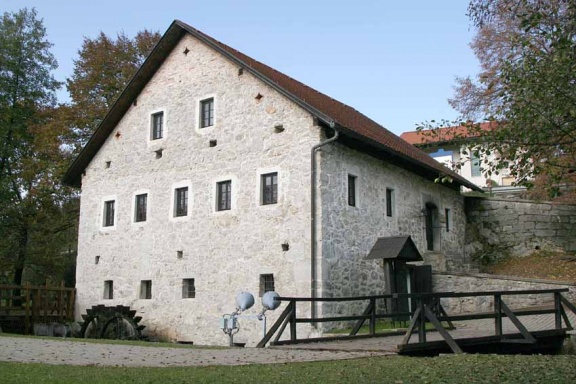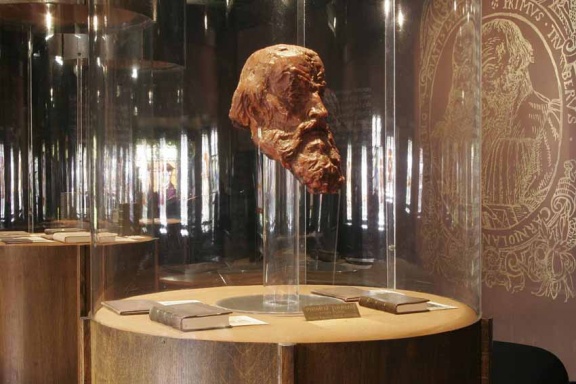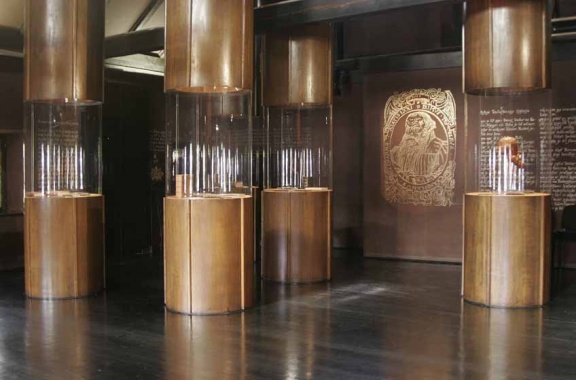Difference between revisions of "Trubar Homestead"
Anže Zorman (talk | contribs) |
(mwtool_article) |
||
| (9 intermediate revisions by 2 users not shown) | |||
| Line 1: | Line 1: | ||
{{Article | {{Article | ||
| − | | status = | + | | status = NEEDSUPDATE WRITING TOPROOFREAD NIFERTIK! |
| − | | maintainer = | + | | maintainer = Simon Žlahtič |
}} | }} | ||
| + | |||
| + | |||
{{Infobox | {{Infobox | ||
| name = Trubar Homestead | | name = Trubar Homestead | ||
| Line 19: | Line 21: | ||
{{Teaser| | {{Teaser| | ||
| − | {{Image|Trubar Homestead | + | {{Image|Trubar Homestead outside.jpg}} |
[[Trubar Homestead]] was opened in the village of Rašica, near Velike Lašče, in [[Established::1986]] on the 400th anniversary of the death of [[Primož Trubar]] (1508–1586). He is considered to be the founder of the literary Slovene language and was the leader of the Protestant Reformation movement in Slovenia. | [[Trubar Homestead]] was opened in the village of Rašica, near Velike Lašče, in [[Established::1986]] on the 400th anniversary of the death of [[Primož Trubar]] (1508–1586). He is considered to be the founder of the literary Slovene language and was the leader of the Protestant Reformation movement in Slovenia. | ||
| − | Though a very important figure | + | Though a very important figure in his time, not much material evidence is left of his life in Rašica. Consequently, he is presented through copies of his books and some other documents and artefacts connected with his life. That is coupled with stained glass portraits of his famous contemporaries, including some of the rulers of the time. Though lacking any significant material legacy, the guided tours offer an extremely informative insight into the historical contexts and the rather epic story of Primož Trubar. |
Next to the main building are a traditional Slovene ''kozolec'' ("wooden hay-drying rack"), a water-driven Venetian sawmill, the [[Skedenj Gallery]] and a well-kept park area. The former stables have been turned into an inn and the granary into a reception and a shop. | Next to the main building are a traditional Slovene ''kozolec'' ("wooden hay-drying rack"), a water-driven Venetian sawmill, the [[Skedenj Gallery]] and a well-kept park area. The former stables have been turned into an inn and the granary into a reception and a shop. | ||
| Line 30: | Line 32: | ||
==Background== | ==Background== | ||
| − | Led by [[Trubarjevi kraji Public Institute]], the Trubar Homestead is not actually located on the spot of Trubar's birthplace ( | + | Led by [[Trubarjevi kraji Public Institute]], the Trubar Homestead is not actually located on the spot of Trubar's birthplace (which featured a mill as well), but a couple hundred meters lower down the stream. Nothing but some ruins remain of the actual Trubar's mill. The ''Temkov maln'' ("Temk's Mill") nevertheless seemed as good a place as any, as it dates back to approximately the time of Trubar's life and was also run by his relatives. |
| − | + | ==Programme== | |
| − | + | The mill at the Trubar Homestead is ethnologically probably its the most curious piece, being about 200 years old and the only remaining mill of the many that comprised the at one time very active local wood-cutting industry. | |
The homestead occasionally hosts workshops (on book printing, bookbinding and similar), painting exhibitions, theatre shows, lectures, literary evenings and and also an annual fine arts colony. | The homestead occasionally hosts workshops (on book printing, bookbinding and similar), painting exhibitions, theatre shows, lectures, literary evenings and and also an annual fine arts colony. | ||
| + | |||
| + | {{Image|Trubar Homestead, Velike Lašče 1.jpg}} | ||
| + | |||
==See also== | ==See also== | ||
| Line 53: | Line 58: | ||
[[Category:Literature museums]] | [[Category:Literature museums]] | ||
[[Category:Literature]] | [[Category:Literature]] | ||
| + | [[Category:Literature_museums_and_archives]] | ||
Latest revision as of 01:14, 19 February 2021
-
to
1 May 2010
31 Oct 2010
Slovene Pavillion at Expo 2010 Shanghai featuring Herman Potočnik Noordung, Starck with Riko, Primož Trubar and World Book Capital Ljubljana 2010, with contributions by Oskar Kogoj, Matej Andraž Vogrinčič, and Slavoj Žižek
Background
Led by Trubarjevi kraji Public Institute, the Trubar Homestead is not actually located on the spot of Trubar's birthplace (which featured a mill as well), but a couple hundred meters lower down the stream. Nothing but some ruins remain of the actual Trubar's mill. The Temkov maln ("Temk's Mill") nevertheless seemed as good a place as any, as it dates back to approximately the time of Trubar's life and was also run by his relatives.
Programme
The mill at the Trubar Homestead is ethnologically probably its the most curious piece, being about 200 years old and the only remaining mill of the many that comprised the at one time very active local wood-cutting industry.
The homestead occasionally hosts workshops (on book printing, bookbinding and similar), painting exhibitions, theatre shows, lectures, literary evenings and and also an annual fine arts colony.
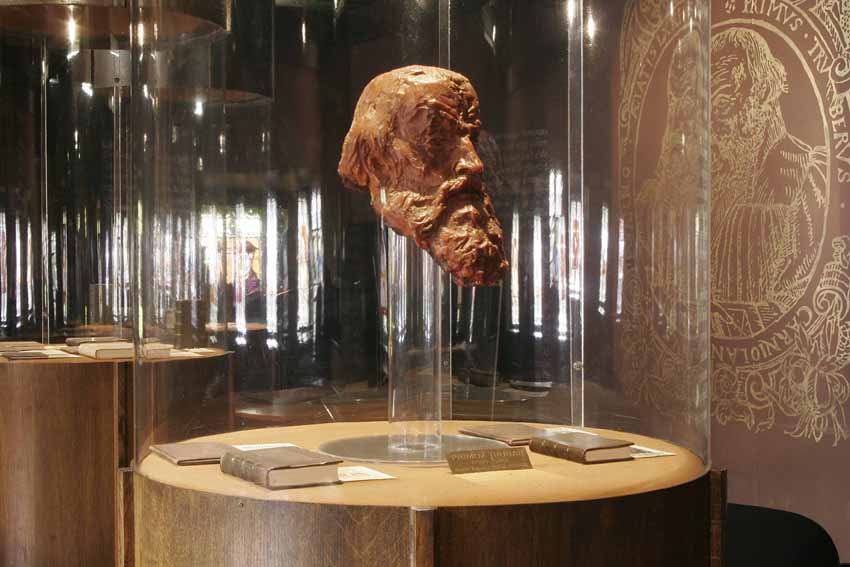 Primož Trubar's head and the books, a part of installation at the Trubar Homestead museum in Velike Lašče, Slovenia
Primož Trubar's head and the books, a part of installation at the Trubar Homestead museum in Velike Lašče, Slovenia
See also
- Trubarjevi kraji Public Institute
- Turjak Castle
- Levstik House – Memorial Rooms of Fran Levstik and Josip Stritar
External links
Gallery
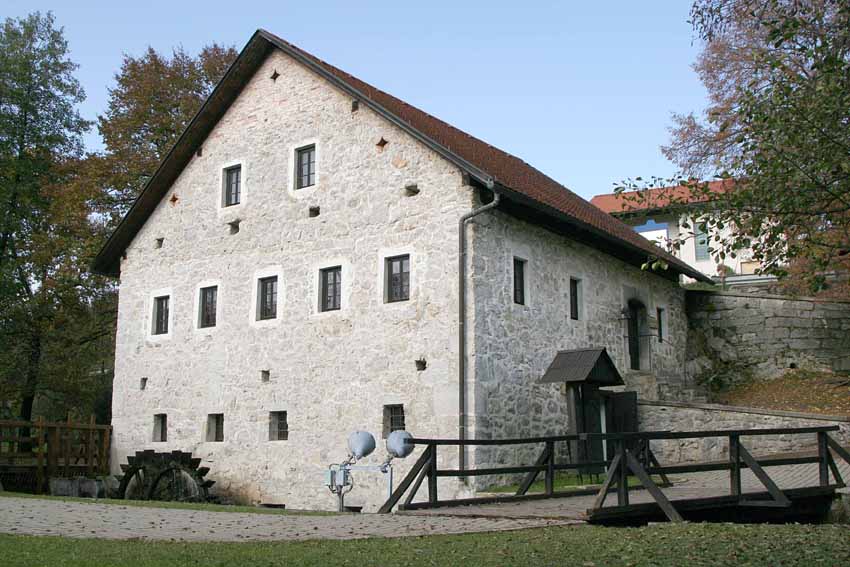 The Trubar Homestead in Velike Lašče dates back to approximately the time of Primož Trubar's life and was also run by his relatives. +
The Trubar Homestead in Velike Lašče dates back to approximately the time of Primož Trubar's life and was also run by his relatives. +


